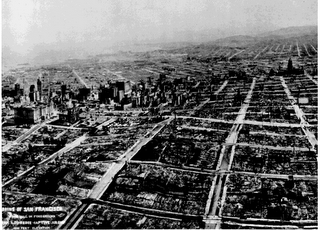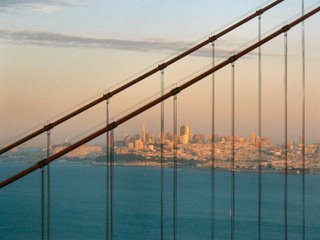A hundred years ago last week, God tried to take San Francisco. The city was leveled by a shattering earthquake, then burned for three days. But she wouldn’t go.

City Hall after the earthquake and fire
Oh, how I was tempted to write that God tried to take “my city.” San Francisco is the city I love above all others. More than others I have visited and love deeply – Chicago, London, Denver. And surely more than those I have yet to see – New York, Rome. Words cannot express how I love San Francisco, how strong the feeling of desperation can be, wanting to be there. I don’t know if I will ever live there. I know I will always want to.
A hundred years ago last Tuesday (April 18), in the early morning when the sun was just starting to light the day, the earth split open a few miles west of the city, somewhere under the ocean. Modern estimates suggest the magnitude of the quake was 8.25. (Compare that with the earthquake we can probably all remember from 1989 – the one that knocked out whole sections of bridges – that measured a mere 6.7.) Then, of course, the fire came.

Some photos of the city were taken just as the fires were staring to burn.
Like so many cities of the time, San Francisco was a hastily constructed city, which is to say it was wooden. The quake both started fires and cracked what few water supply pipe there were that might have helped firefighters. No one ever actually stopped the fires, after three days they had simply burned everything there was to burn. 25,000 buildings were destroyed. As many as 700 died. And 250,000 people were left homeless.

The city, five weeks after the fires burned themselves out.
What is it about great American cities and perilous locations? Rome was famously built among seven hills for protection and as a reward has endured for millennia. Here in America we eschew such logic. Everyone likes to joke about how the Dutch bought Manhattan from the natives for $24 (though the story about it being $24 worth of beads is untrue), but frankly $24 for a swamp isn’t a bad deal. New York, the very capital of the world, is built on a piece of “land” that’s little more than a sandbar between rivers. Chicago burned down in 1871. Then there are Los Angeles and San Francisco, built along beautiful coastlines where mountains meet the sea. Pity that all that beauty is largely the result of one of the world’s more active faults. Consider where I live: Phoenix, the country’s fifth-largest city, built in a place with no water. And must I even mention New Orleans?
Thing is, and I don’t say this to in any way minimize the horror of what has become of New Orleans, some day – probably within our lifetime – something will happen to San Francisco much worse than what happened in the Gulf last September. A 2003 study found a 62% probability that a 6.7 or greater magnitude quake will hit in San Francisco between now and 2032. That is, there’s a better chance than not that within the next 25 years, San Francisco will be hit by an earthquake worse than the 1989 event. Have I mentioned that the neighborhoods hardest hit by the 1989 quake even still aren’t completely repaired?
Simon Winchester recently wrote a book about the 1906 earthquake and devoted the better part of a chapter to warning how easily it could happen again. It’s a terrifying book. Scary enough most Californians don’t even want to hear about it, as he notes in this article.
“Fragile” he calls San Francisco. If you’ve ever been there, can you possibly disagree?

But – and this I know is completely crazy – it doesn’t make me want to live there any less.
I went to New Orleans once and I’m glad I did because I’ll never get to go back. Even if I again make it to a city by that name I know the place will not be the same.
And I still want to live in San Francisco. Because – look at the place – how can you not? Because, if the worst one day happens, at least I would be able to say: I lived there once, before God finally had his way, and took it.

Why wouldn't you want to live in this place?
